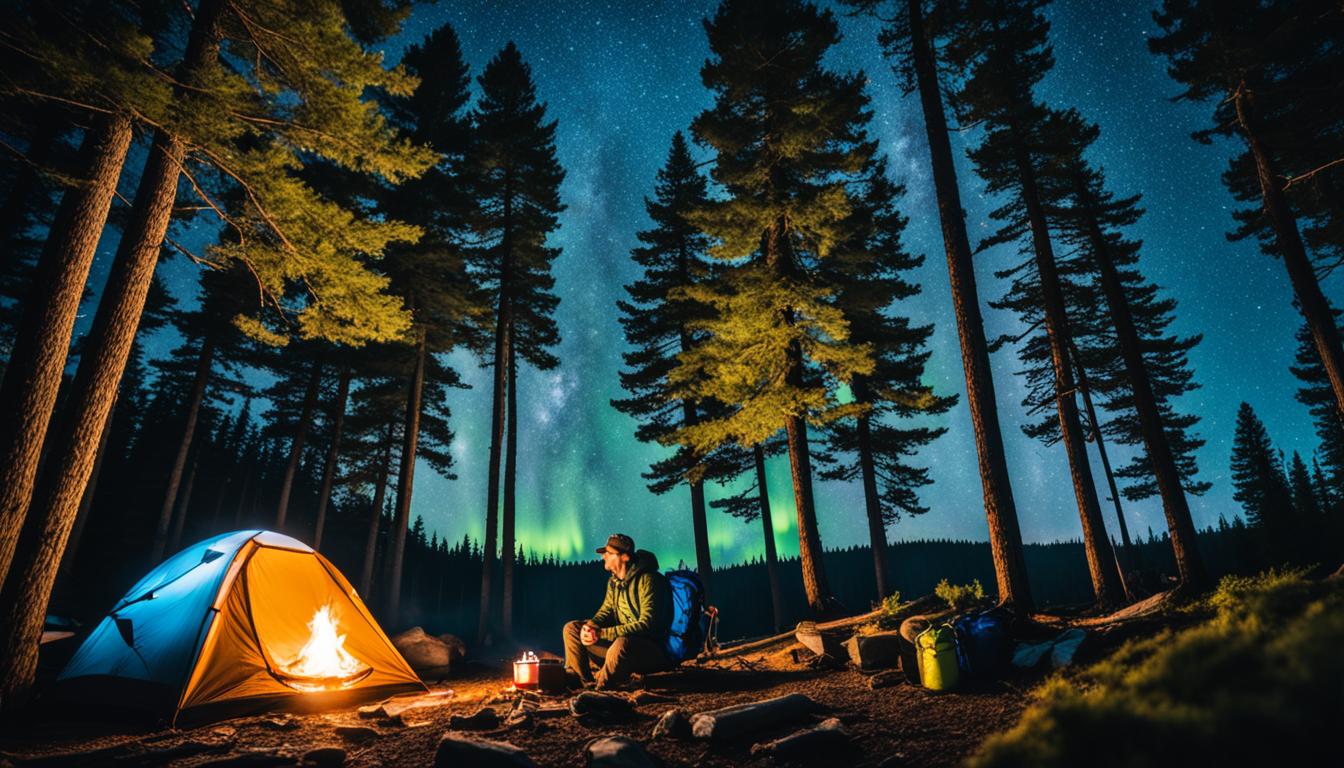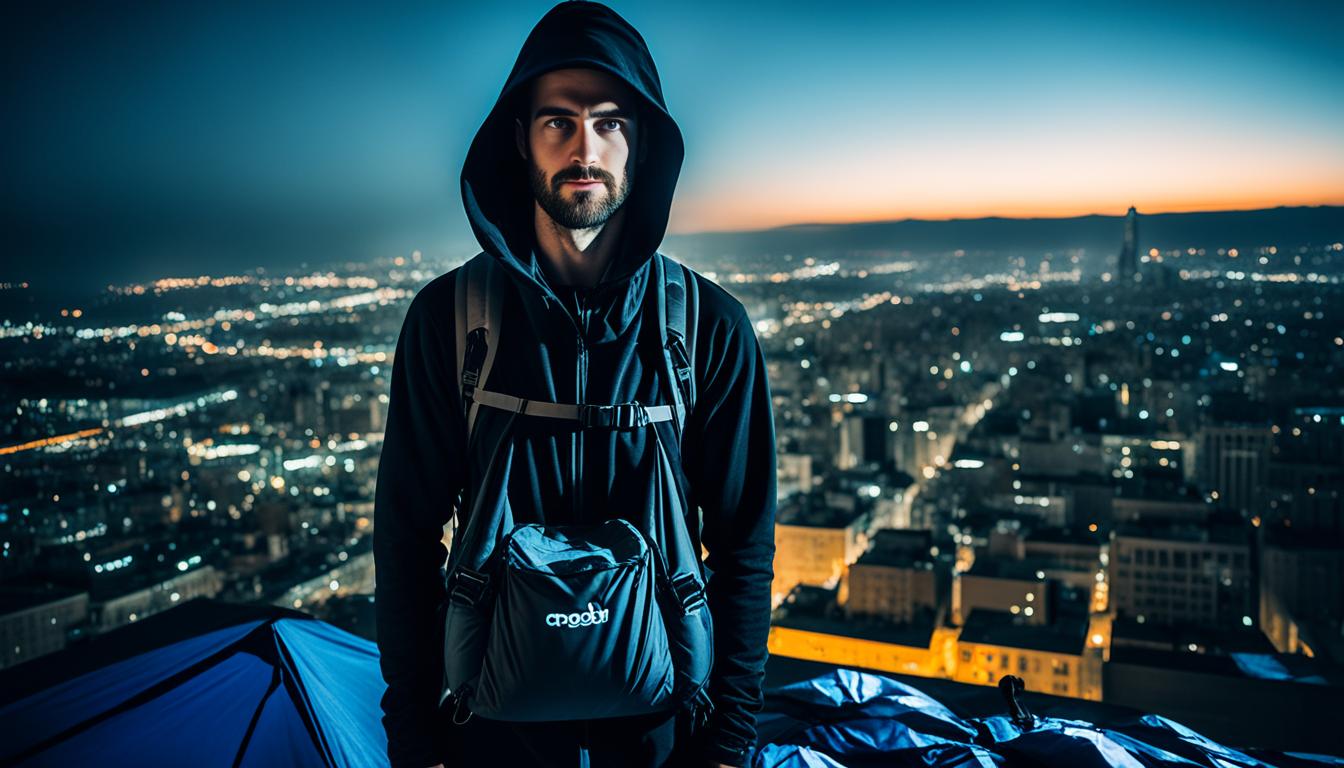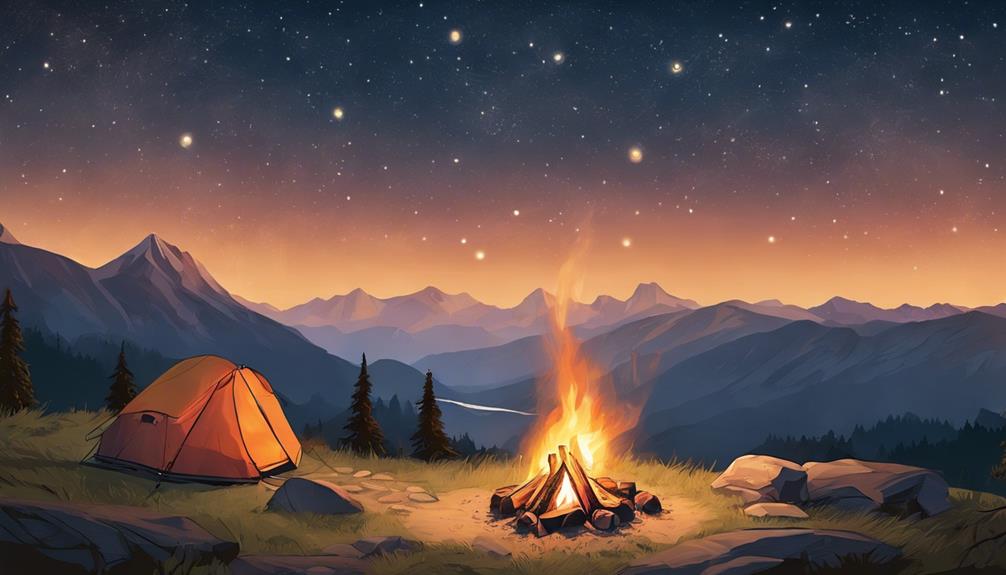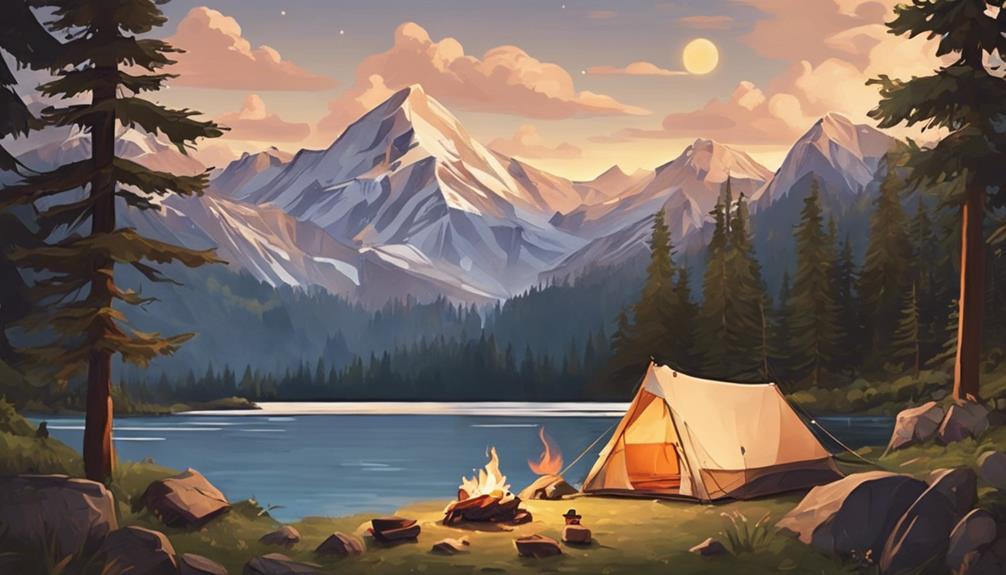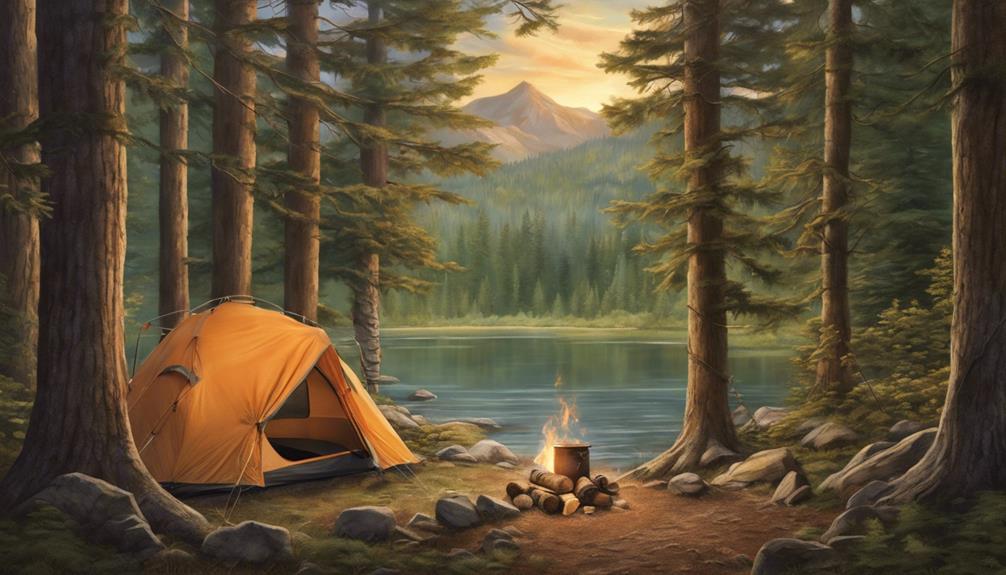Did you know that more than 6 million Americans go on **solo camping** trips each year? **Solo camping**, or **camping alone**, is becoming more popular as individuals look for ways to get away from the busy routine of daily life and reconnect with nature. It gives you the opportunity to be present, move at your own speed, acquire important camping abilities, and establish a stronger bond with the environment. In this **solo camping guide**, we will share crucial advice and details to guarantee a secure and fun **solo camping** adventure. Join us on this journey!
Key Takeaways:
- Over 6 million Americans go solo camping each year.
- Solo camping offers an opportunity to disconnect from everyday life and immerse oneself in nature.
- It allows you to go at your own pace and learn valuable camping skills.
- Preparing and planning ahead are crucial for a successful solo camping trip.
- Prioritize safety by informing someone about your plans and familiarizing yourself with the camping area.
Benefits of Solo Camping
When it comes to camping, the idea of going alone may seem intimidating or unconventional. However, solo camping offers a myriad of unique benefits that can enhance your outdoor experience. Camping alone allows you to fully immerse yourself in nature, at your own pace, free from the distractions and stressors of group dynamics. In this section, we will explore the advantages of solo camping and how it can be a truly rewarding adventure.
The Ability to Go at Your Own Pace
One of the significant benefits of solo camping is the freedom to set your own schedule and explore at your own pace. You are not constrained by the preferences or limitations of others, allowing you to prioritize activities that truly resonate with you. Whether you prefer a leisurely hike, a day of fishing, or simply sitting by the campfire and enjoying the solitude, solo camping enables you to tailor your experience to your desires.
Learning Camping Skills
Camping alone provides a valuable opportunity to learn and refine essential camping skills. Without the assistance or reliance on others, you are challenged to develop self-sufficiency and problem-solving abilities. From setting up your tent to building a fire and cooking meals, solo camping allows you to hone these skills and gain confidence in your outdoor abilities.
A Connection with Nature, Undistracted
Being alone in nature allows you to fully immerse yourself in its beauty and serenity. Without the distractions of conversations or noise, solo camping provides an unparalleled opportunity to connect with the natural world on a deeper level. You can observe wildlife, listen to the rustling of leaves, and appreciate the quiet moments that are often overlooked in a group setting.
“In nature, nothing is perfect and everything is perfect. Trees can be contorted, bent in weird ways, and they’re still beautiful.” – Alice Walker
Increased Self-Confidence
Solo camping can be a transformative experience that boosts personal growth and self-confidence. Overcoming challenges and accomplishing tasks on your own instills a sense of empowerment and resilience. You become more self-reliant and develop a greater belief in your abilities to handle various situations. This newfound confidence can extend beyond the camping trip and positively impact other areas of your life.
Reduced Potential Stressors from Group Dynamics
Group camping can sometimes involve conflicts or compromises that can detract from the overall experience. When camping alone, you are liberated from such stressors and can fully focus on your own needs and interests. You can choose activities and locations that align with your preferences, creating a more harmonious and enjoyable camping experience.
So, if you’re seeking a unique and rewarding adventure, consider embarking on a solo camping trip. It allows you to embrace solitude, connect with nature, and discover the joys of self-reliance. The benefits of solo camping go beyond the superficial, offering personal growth, increased self-confidence, and a deeper appreciation for the magnificence of the natural world.
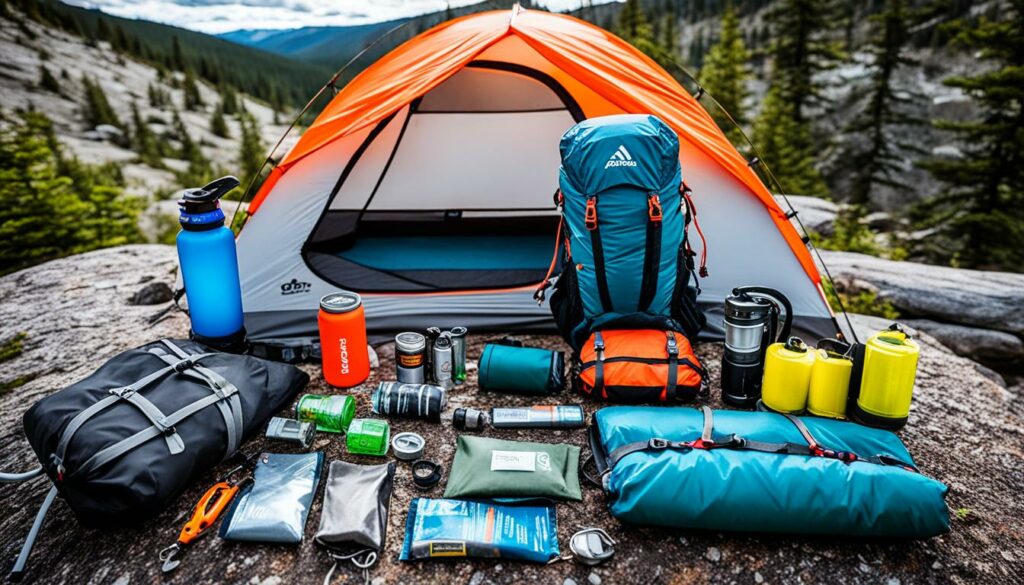
| Essential Gear for Solo Camping | Description |
|---|---|
| Tent | A high-quality, lightweight tent for shelter and protection. |
| Sleeping bag | A reliable sleeping bag for a comfortable night’s rest. |
| Cooking equipment | Portable stove, cookware, and utensils for preparing meals. |
| Headlamp or flashlight | Light source for visibility and safety in low light conditions. |
| Multitool | Compact tool with various functions for tasks and emergencies. |
| First aid kit | Comprehensive kit for treating minor injuries and emergencies. |
| Water filtration system | Device for purifying water and ensuring a safe drinking source. |
Safety Tips for Solo Camping
Solo camping can be a rewarding and invigorating experience, but it’s crucial to prioritize safety during your adventure. By taking necessary precautions, you can ensure a safe and enjoyable solo camping trip. Here are some essential safety tips for staying safe while camping alone:
Familiarize yourself with potential risks
- Research the area where you plan to camp. Identify potential risks such as wildlife encounters, poisonous plants, and severe weather conditions.
- Learn about local wildlife and their behavior. This knowledge can help you minimize the risk of encounters and take appropriate precautions.
Inform someone you trust
Before heading out for your solo camping trip, make sure to inform someone you trust about your plans. Provide them with details such as your planned route, expected return date, and any emergency procedures you have in place. In case of an unexpected situation, this information will help ensure that someone knows where you are and can take action if needed.
Carry a first aid kit and know basic first aid skills
Accidents can happen even in the safest of environments, so it’s essential to carry a well-stocked first aid kit. Make sure your kit includes essentials like bandages, antiseptic ointment, pain relievers, and any necessary medications. Additionally, take the time to learn basic first aid skills. Knowing how to handle common camping injuries can make a significant difference in an emergency situation.
Follow Leave No Trace principles
As responsible campers, it’s important to follow Leave No Trace principles to minimize our impact on the environment and preserve the natural beauty of the wilderness. These principles include practices such as properly disposing of waste, minimizing campfire impact, and respecting wildlife and vegetation. By respecting nature, we not only protect the environment but also maintain our safety and the safety of others.
Remember, solo camping can be an incredible experience, but it’s crucial to prioritize safety. By familiarizing yourself with potential risks, informing someone about your plans, carrying a first aid kit, and following Leave No Trace principles, you can have a safe and enjoyable solo camping adventure.
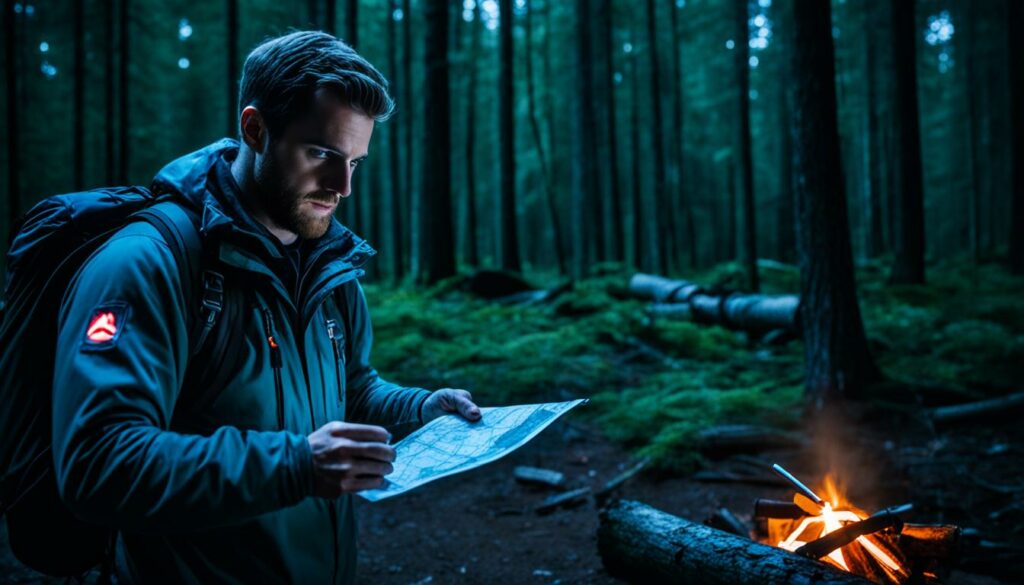
| Risk | Precautions |
|---|---|
| Wildlife encounters | Research local wildlife and their behavior. Store food securely and follow proper food storage practices. Carry bear spray or other wildlife deterrents as necessary. |
| Poisonous plants | Learn to identify poisonous plants and avoid contact. Familiarize yourself with common plants in the area and educate yourself on potential hazards. |
| Severe weather conditions | Check weather forecasts before your trip and pack appropriate clothing and gear. Be prepared for sudden changes in weather and seek shelter if necessary. |
Preparing for Solo Camping
Preparing for solo camping requires careful planning and consideration. When embarking on a solo adventure in the great outdoors, it’s important to be well-prepared to ensure a safe and enjoyable experience. Here are some essential steps to help you prepare for your solo camping trip.
Research the Camping Area
Before heading out, spend some time researching the camping area where you plan to camp alone. Familiarize yourself with the terrain, facilities, and any potential hazards. Take note of any rules and regulations specific to the area to ensure you are prepared and compliant.
Create a Checklist
Making a checklist of essential items to pack is a crucial step in preparing for solo camping. This will help ensure you have everything you need for a comfortable and safe trip. Consider including items such as:
- Tent
- Sleeping bag
- Cooking equipment
- First aid kit
- Navigation tools (GPS device or map)
- Appropriate clothing and footwear
Feel free to customize your checklist based on your specific needs and preferences.
Inform Someone About Your Plans
“Safety begins with proper communication. Before embarking on your solo camping trip, inform someone you trust about your plans, including your intended location, expected duration of the trip, and when you expect to return. This way, someone will be aware of your whereabouts and can alert authorities if necessary.”
Pack a GPS Device or Map
Carrying a GPS device or map is essential for navigation during solo camping trips. Ensure you are familiar with how to use your navigation tools and always have them easily accessible. This will help you stay on track and avoid getting lost in unfamiliar terrain.”
Consider Weather Conditions
Check the weather forecast for the duration of your camping trip and pack appropriate clothing and gear accordingly. Be prepared for changes in weather and ensure you have adequate protection against rain, wind, or extreme temperatures.
Stay Safe, Have Fun!
By taking the time to prepare and plan for your solo camping adventure, you’ll be well-equipped to tackle any challenges that come your way. So pack your gear, embrace the solitude, and enjoy the beauty of nature on your solo camping trip!
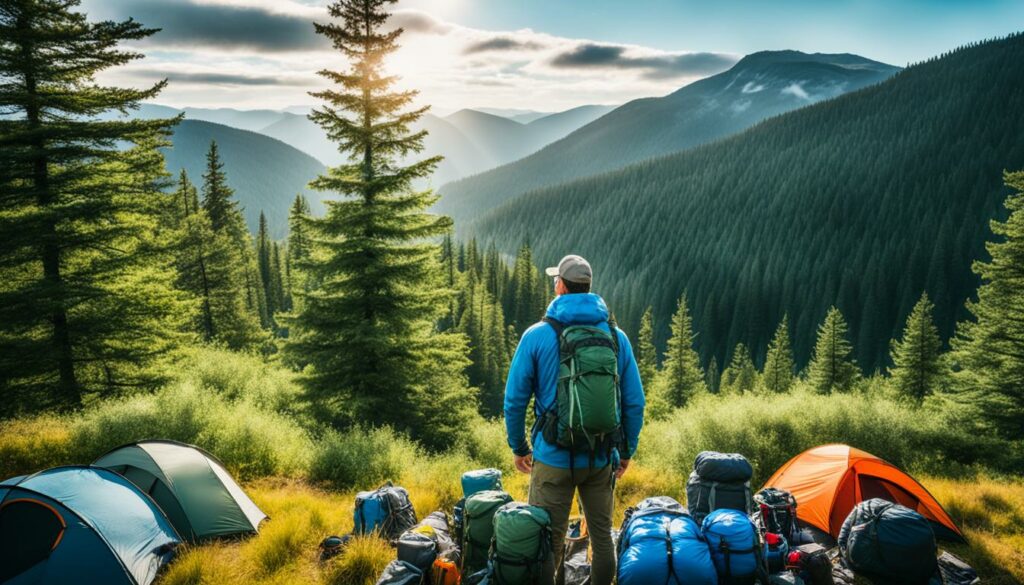
| Essential Items to Pack | Clothing | Navigation | Safety |
|---|---|---|---|
| Tent | Appropriate clothing for various weather conditions | GPS device or map | First aid kit |
| Sleeping bag | Hiking boots and comfortable footwear | Compass | Firestarter |
| Cooking equipment | Extra layers for warmth | Trail guidebook | Bear spray or wildlife deterrent |
Planning Your Route
Planning your route is a crucial step in ensuring a safe and enjoyable solo camping trip. By carefully considering factors such as trail conditions, estimated time, and potential obstacles, you can create a well-structured itinerary that aligns with your abilities and preferences.
Start by researching the trails in your chosen camping area. Look for up-to-date maps and trail guides that provide detailed information on the routes available. Take note of the distance, elevation gain, and difficulty level of each trail to determine which ones are suitable for your solo adventure.
When planning your route, consider any potential obstacles along the way. This could include water crossings, steep climbs, or difficult terrain. Take into account your fitness level, hiking experience, and the amount of time you have available. It’s important to set realistic expectations and choose a route that matches your capabilities.
Research Wildlife Activity
In addition to trail conditions, it’s essential to research the wildlife activity in the area. Some camping areas may have a higher presence of bears, cougars, or other potentially dangerous animals. By understanding the wildlife patterns, you can plan your route to avoid areas with high animal activity and reduce the risk of encounters.
If you’re camping in an area known for bear encounters, consider packing bear spray or other wildlife deterrents. These items can provide an extra layer of protection and peace of mind as you explore the wilderness.
Create a Detailed Itinerary
Once you have gathered all the necessary information, it’s time to create a detailed itinerary for your solo camping trip. This should include the trails you plan to hike, approximate distances, estimated time for each hike, and any campsites or rest areas along the way.
Organize your itinerary in a clear and concise manner, highlighting key points such as starting points, landmarks, and any important notes or considerations. This will help you stay on track and ensure you make the most of your time in nature.
Share Your Itinerary
It’s always a good idea to share your camping itinerary with someone you trust. Provide them with a copy of your planned route, including the expected dates and times of your departure and return. This ensures that someone knows where you will be and when to expect you back, providing an added layer of safety and peace of mind.
By planning your route carefully, considering trail conditions, wildlife activity, and creating a detailed itinerary, you can embark on a solo camping trip with confidence and peace of mind.
How to Make the Most of Your Solo Camping Experience
Solo camping provides a unique opportunity for self-discovery and personal growth. It allows us to escape the noise and distractions of everyday life and immerse ourselves in the serenity of nature. To truly make the most of your solo camping experience, here are some tips to consider:
Disconnect from Technology
Leave behind the digital world and fully embrace the natural environment. Disconnecting from technology allows us to be present in the moment and appreciate the beauty around us. Instead of scrolling through social media or checking emails, take the time to enjoy the peacefulness of nature and focus on your surroundings.
Engage in Activities You Enjoy
Solo camping gives us the freedom to engage in activities that we truly enjoy. Whether it’s hiking, fishing, stargazing, or simply reading a book by the campfire, take this time to indulge in the things that bring you joy. Use solo camping as an opportunity to recharge and do the activities that make you feel alive.
Reflect and Connect with Nature
Solo camping provides a quiet space for self-reflection. Take the time to ponder on your thoughts, goals, and aspirations. Allow the solitude and tranquility of nature to inspire you. Observe the intricate details of the natural world around you—listen to the rustling of leaves, watch the dance of the flames in the fire, and feel the gentle breeze on your skin. Connect with nature and let it rejuvenate your mind, body, and soul.
“In the wilderness, I find solace. It is where I can truly be myself, away from the expectations and noise of society. Solo camping allows me to reconnect with nature and find peace within.” – Anonymous
Embrace the Challenges
Solo camping may present challenges that require you to step out of your comfort zone. Embrace these challenges as opportunities for personal growth. Overcoming obstacles and relying on your own skills and instincts builds resilience and self-confidence. Remember, it’s in facing challenges that we discover our true capabilities.
Savor the Solitude and Create Lasting Memories
Embrace the solitude that solo camping provides. Take time to enjoy your own company and relish in the peace and quiet. Use this opportunity to reflect on your life and create lasting memories. Capture beautiful moments with your camera or in a journal to commemorate your solo camping adventures.
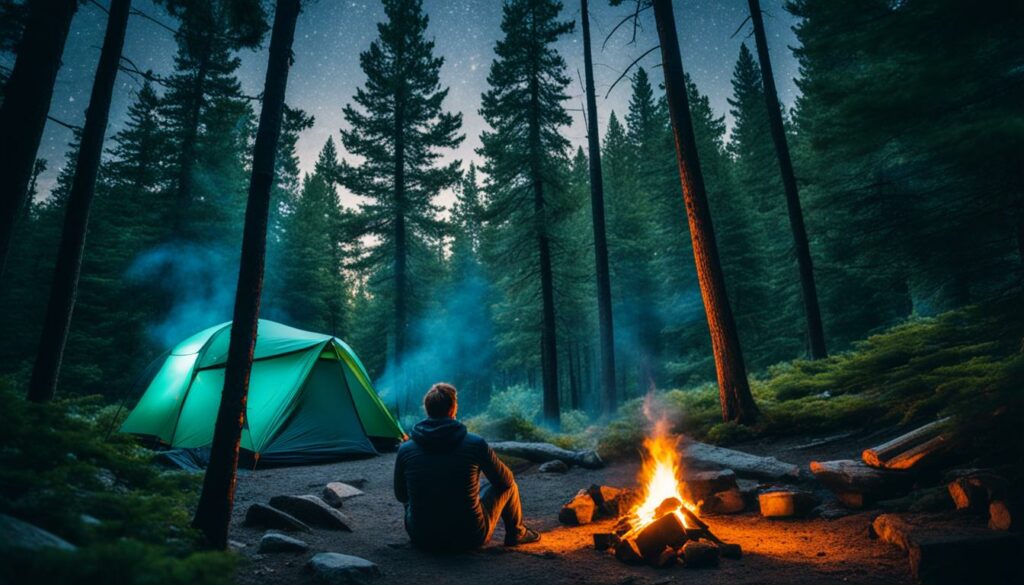
The Rewards of Solitude
Solo camping offers us the chance to escape from the demands of everyday life and immerse ourselves in the beauty of nature. It allows us to reconnect with ourselves, find inner peace, and gain a deeper understanding of our place in the world. By making the most of our solo camping experience, we can return home feeling refreshed, inspired, and grateful for the time spent in solitude.
Conclusion
Embarking on a solo camping adventure can be a transformative experience. By following the tips and guidelines outlined in this guide, you will be well-prepared for a safe and enjoyable trip. Prepare ahead of time, choose the right campsite, pack the essential gear, prioritize safety, and make the most of your solo camping experience.
Solo camping offers a unique opportunity for self-reflection, solitude, and connection with nature. It allows us to disconnect from our busy lives and immerse ourselves in the beauty and tranquility of the great outdoors. With each solo camping trip, we learn to rely on our own skills, adapt to unexpected challenges, and discover our inner strength.
In our solo camping wrap-up, remember to stay focused on the present moment and appreciate the simple joys of nature. Watch the sunrise from your tent, listen to the soothing sounds of the wilderness, and marvel at the star-filled sky. Solo camping is not just about surviving in the outdoors; it’s about thriving in the embrace of solitude, finding solace in nature, and creating memories that will last a lifetime.
What are the essential tips and tricks for solo camping success?
When it comes to solo camping, preparation is key. Researching solo camping tips and tricks can make the difference between a successful trip and a stressful one. Make sure to pack lightly, bring essential safety gear, and always let someone know your plans beforehand. Happy camping!
FAQ
What are the benefits of solo camping?
Solo camping offers the ability to go at your own pace, learn camping skills, connect with nature without distractions, increase self-confidence, and reduce potential stressors from group dynamics. It provides a valuable opportunity for self-reflection and solitude in nature.
How do I prepare for solo camping?
To prepare for solo camping, gradually work your way up by gaining experience in camping with a group first. Ensure you have the necessary camping skills and essentials, familiarize yourself with the camping area and its rules and regulations, and share your plans with someone you trust. Additionally, check the weather forecast, pick the right campsite, and practice keeping your mind calm in the wilderness.
How do I choose the right campsite for solo camping?
When choosing a campsite for solo camping, consider factors such as safety, comfort, and personal preferences. Look for a location with flat and even terrain, no presence of wild predators and poisonous plants, and reliable reception if possible. Consider the availability of amenities and facilities, such as clean water and restroom facilities. Familiarize yourself with the campground symbols and rules to ensure a smooth camping experience.
What gear do I need for solo camping?
Some essential gear to pack for solo camping includes a high-quality tent, sleeping bag, cooking equipment, headlamp or flashlight, multitool, first aid kit, and water filtration system. Consider your specific needs and preferences for the camping trip and ensure you have all the necessary equipment and supplies.
How can I stay safe while camping alone?
Safety should be a priority when camping alone. Inform someone you trust about your plans and expected return date. Familiarize yourself with potential risks in the area, such as wildlife encounters and severe weather conditions. Carry a first aid kit and know basic first aid skills. Follow Leave No Trace principles to minimize your impact on the environment.
How should I plan my route for solo camping?
Planning your route is essential for a safe and enjoyable solo camping trip. Research the trails and obtain a good map of the camping area. Consider the estimated time and potential obstacles along the route, such as water crossings or steep climbs. Research the wildlife in the area and plan your route accordingly to avoid areas with high animal activity. Pack bear spray or other wildlife deterrents as a precaution.
How can I make the most of my solo camping experience?
To make the most of your solo camping experience, disconnect from technology, engage in activities you enjoy, reflect, and connect with nature. Embrace the challenges and learn to rely on your own skills and instincts. Savor the solitude and create lasting memories. Solo camping is a chance to fully immerse yourself in the beauty of nature and reap the rewards of solitude.

